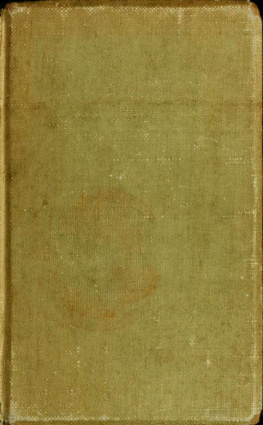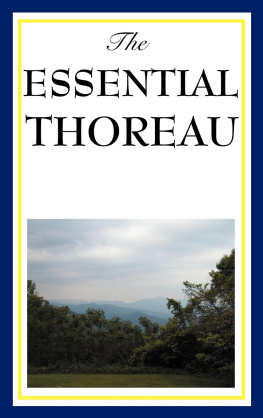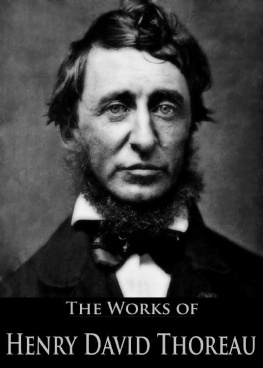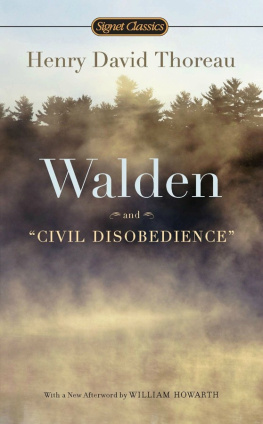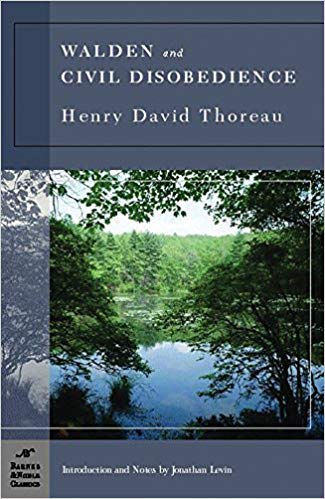
Table of Contents
From the Pages ofWalden and
Civil Disobedience
As if you could kill time without injuring eternity. (from Walden, page 11)
The mass of men lead lives of quiet desperation. (from Walden, page 11)
It is never too late to give up our prejudices. (from Walden, page 11)
Most of the luxuries, and many of the so called comforts of life, are not only not indispensable, but positive hinderances to the elevation of mankind. (from Walden, pages 1516)
My purpose in going to Walden Pond was not to live cheaply nor to live dearly there, but to transact some private business with the fewest obstacles; to be hindered from accomplishing which for want of a little common sense, a little enterprise and business talent, appeared not so sad as foolish. (from Walden, page 19)
Beware of all enterprises that require new clothes. (from Walden, page 21)
Men have become the tools of their tools. (from Walden, page 33)
I do not propose to write an ode to dejection, but to brag as lustily as chanticleer in the morning, standing on his roost, if only to wake my neighbors up. (from Walden, page 69)
I went to the woods because I wished to live deliberately, to front only the essential facts of life, and see if I could not learn what it had to teach, and not, when I came to die, discover that I had not lived. (from Walden, page 74)
Every path but your own is the path of fate. Keep on your own track, then. (from Walden, page 95)
I was seized and put into jail, because, as I have elsewhere related, I did not pay a tax to, or recognize the authority of, the state which buys and sells men, women, and children, like cattle at the door of its senate-house. I had gone down to the woods for other purposes. But, wherever a man goes, men will pursue and paw him with their dirty institutions, and, if they can, constrain him to belong to their desperate odd-fellow society. It is true, I might have resisted forcibly with more or less effect, might have run amok against society; but I preferred that society should run amok against me, it being the desperate party. (from Walden, page 137)
The universe is wider than our views of it. (from Walden, page 250)
In proportion as he simplifies his life, the laws of the universe will appear less complex, and solitude will not be solitude, nor poverty poverty, nor weakness weakness. If you have built castles in the air, your work need not be lost; that is where they should be. Now put the foundations under them. (from Walden, page 253)
Rather than love, than money, than fame, give me truth. (from Walden, page 258)
Law never made men a whit more just. (from Civil Disobedience, page 266)
Is a democracy, such as we know it, the last improvement possible in government? Is it not possible to take a step further towards recognizing and organizing the rights of man? (from Civil Disobedience, page 286)
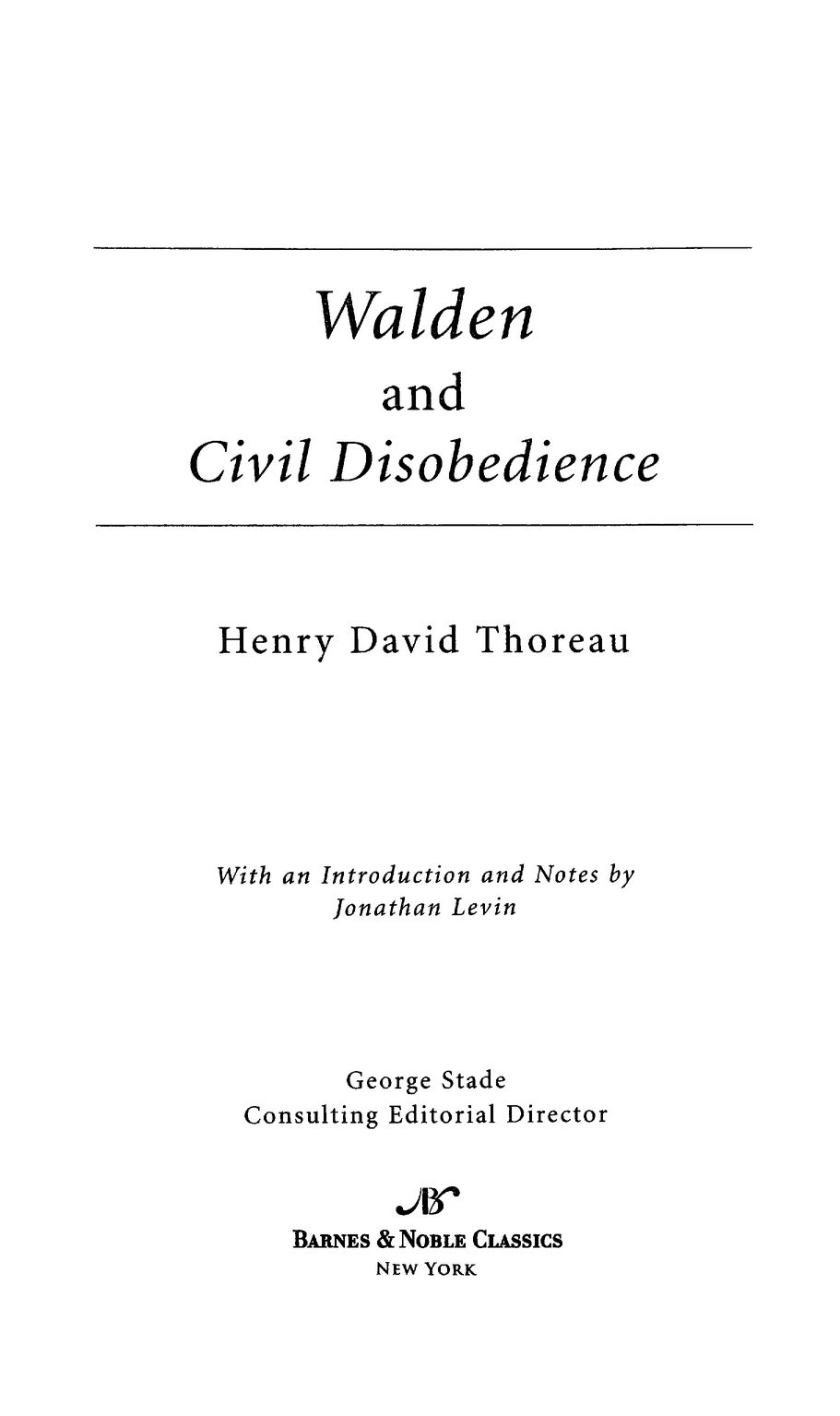
Published by Barnes & Noble Books
122 Fifth Avenue
New York, NY 10011
www.barnesandnoble.com/classics
Walden was first published as Walden: or, Life in the Woods in 1854. On the Duty of Civil Disobedience was originally published as Resistance to Civil Government in 1849.
Originally published in 2003 by Barnes & Noble Classics with new Introduction, Notes, Biography, Chronology, Inspired By,
Comments & Questions, and For Further Reading.
Hardcover edition published in 2005.
Introduction, Notes, and For Further Reading
Copyright @ 2003 by Jonathan Levin.
Note on Henry David Thoreau; The World of Henry David Thoreau, Walden, and Civil Disobedience; Inspired by Walden; and Comments & Questions
Copyright @ 2003 by Barnes & Noble, Inc.
All rights reserved. No part of this publication may be reproduced or transmitted in any form or by any means, electronic or mechanical, including photocopy, recording, or any information storage and retrieval system, without the prior written permission of the publisher.
Barnes & Noble Classics and the Barnes & Noble Classics colophon are trademarks of Barnes & Noble, Inc.
Walden and Civil Disobedience
ISBN-13: 978-1-59308-208-6 ISBN-10: 1-59308-208-8
eISBN : 978-1-411-43345-8
LC Control Number 2004102197
Produced and published in conjunction with:
Fine Creative Media, Inc.
322 Eighth Avenue
New York, NY 10001
Michael J. Fine, President and Publisher
Printed in the United States of America
QM
7 9 10 8 6
Henry David Thoreau
Henry David Thoreau was born on July 12, 1817, in Concord, Massachusetts, the third of four children. His family lived on a modest, sometimes meager, income; his father, John, worked by turns as a farmer, schoolteacher, grocer, and pencil-maker; his mother, Cynthia, was a teacher and would take in boarders when money was scarce. Young Henrys gifts manifested themselves early. He wrote his first piece, The Seasons, at age ten, and memorized portions of Shakespeare, the Bible, and Samuel Johnson while studying at the Center School and Concord Academy. In addition to his academic pursuits, Henry rambled through the countryside on exploratory walks and attended lectures at the Concord Lyceum, where as an adult he would fascinate audiences with his discourses on life on Walden Pond.
Thoreau began his studies at Harvard College in 1833. His years at Harvard were stimulating, if solitary; he immersed himself in a traditional humanities curriculum of multiple languages, anatomy, history, and geography. Upon graduation in 1837, he began teaching in Concord at the Center School, the public school hed attended as a boy, but left his post after being told to administer corporal punishment to a student. During these years following college Thoreau published his first essay and poem, began lecturing at the Concord Lyceum, and attended Transcendentalist discussions at the home of his mentor, the renowned essayist and poet Ralph Waldo Emerson. At Emersons urging, Thoreau started a journala project that would become his lifelong passion and culminate in more than two million words.
A boat trip with his brother, John, in 1839 set the foundation for his well-known work A Week on the Concord and Merrimack Rivers. Sadly, unforeseen tragedy separated the tightly knit brothers in 1842, when John died of lockjaw caused by a razor cut. The following year, Thoreau joined Emerson in editing the Transcendental periodical The Dial, a publication to which Thoreau would become a prolific contributor. He also pulled up stakes for a time, accepting a position to tutor Emersons children in Staten Island, New York. Half a year later, Thoreau returned to his familys house in Concord, deeply affected by the abolitionists he had met in Manhattan. He dedicated much of his time to lectures and essays advocating abolition and became involved in sheltering runaway slaves on their journey north.
Next page


